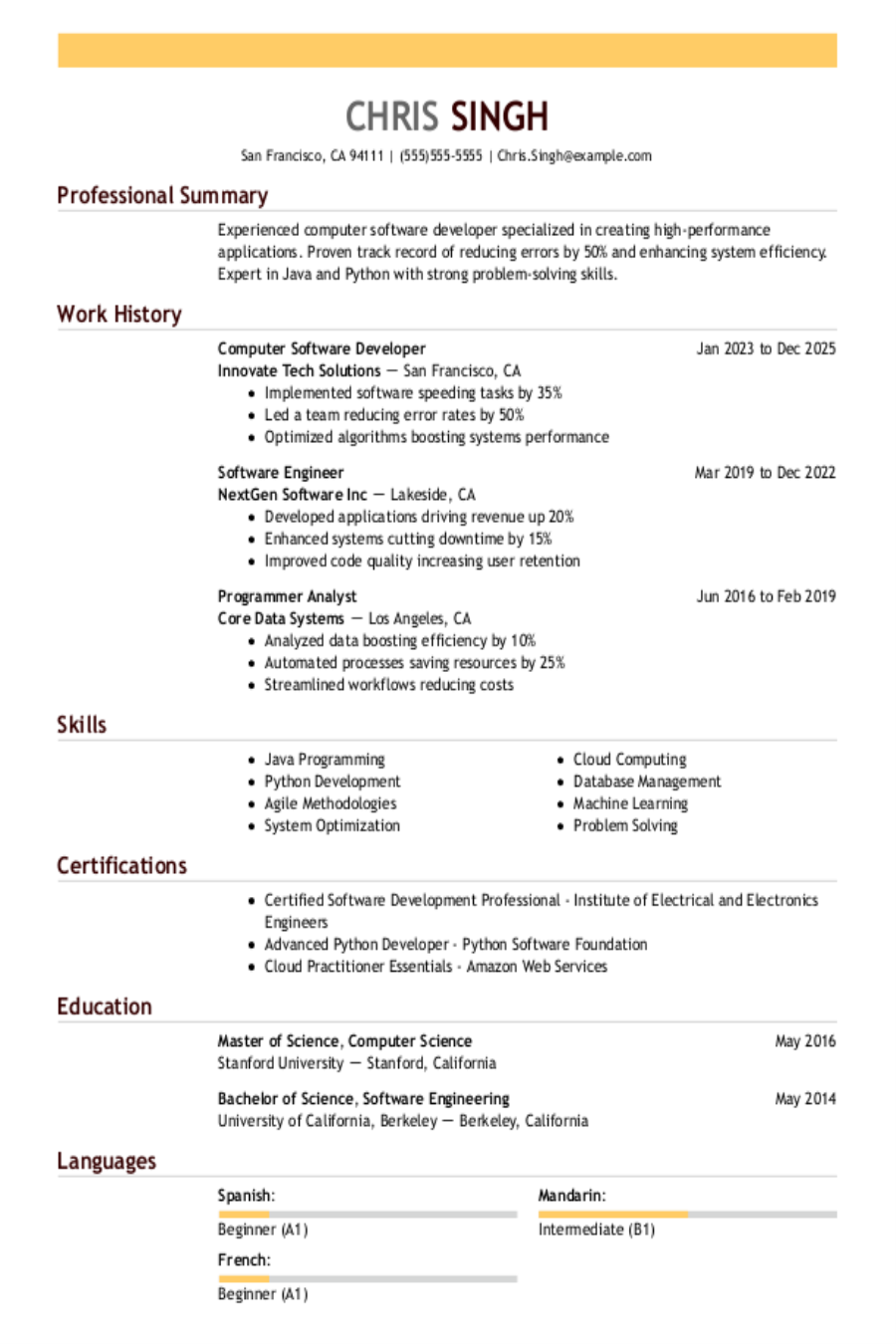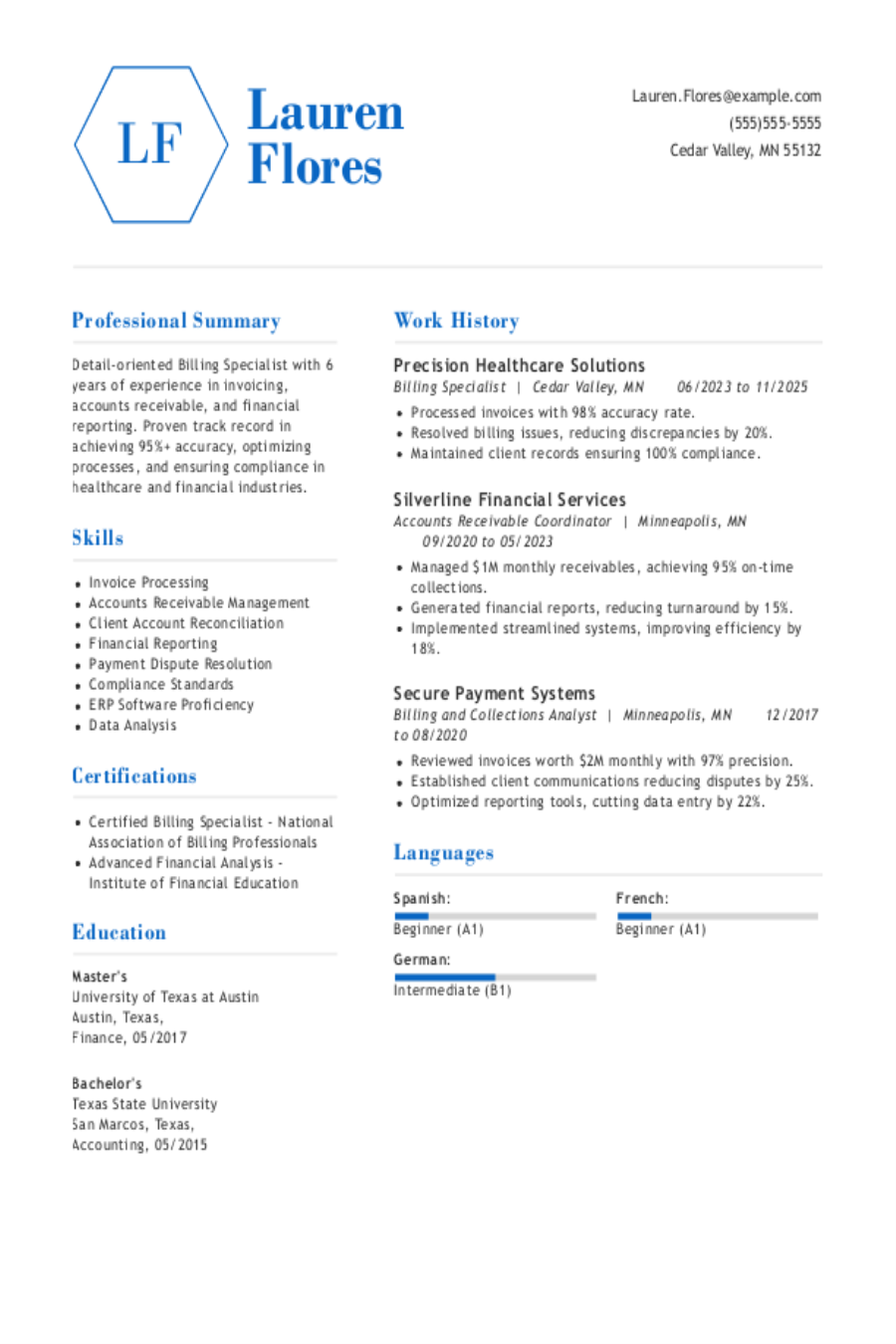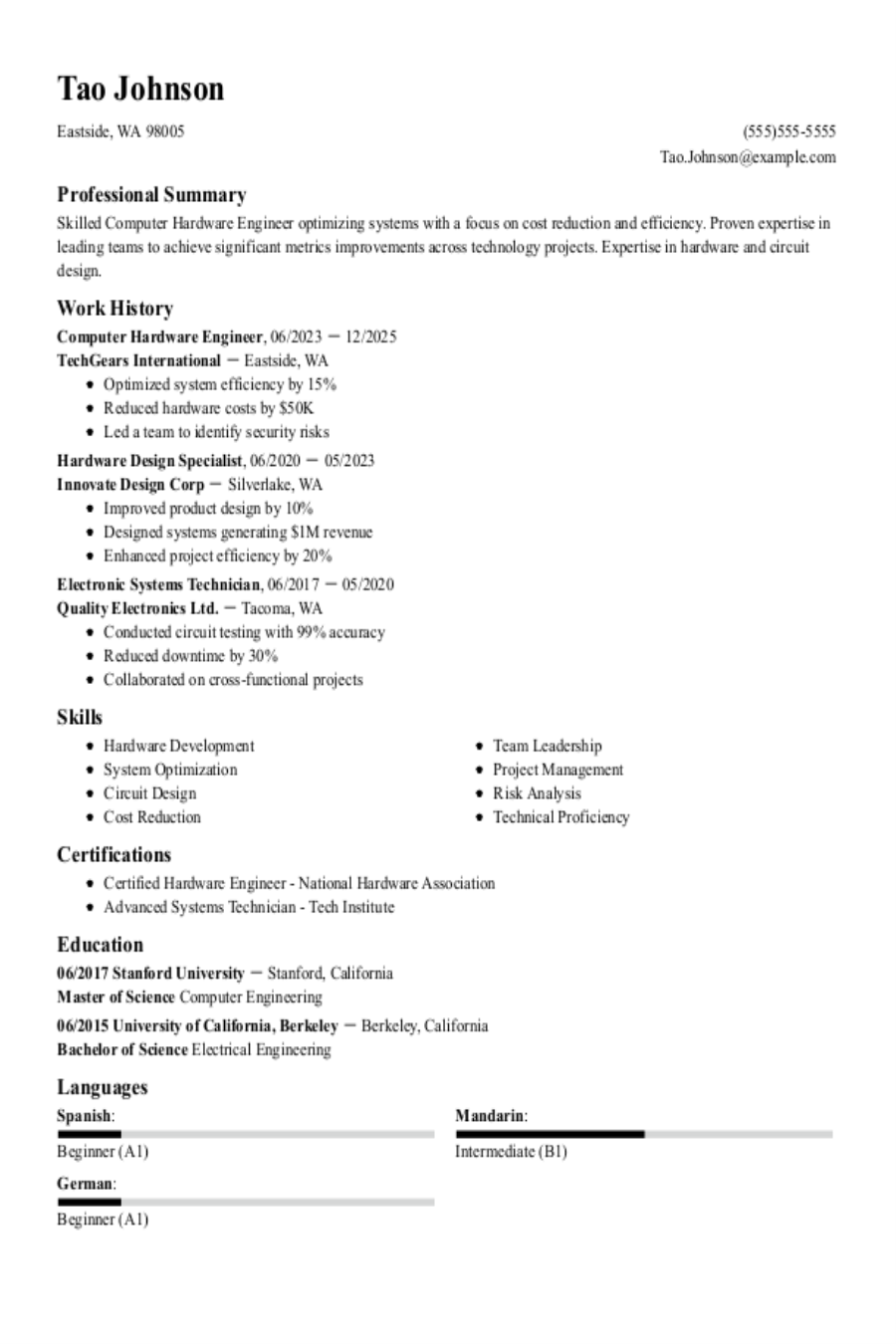Popular Doctor Resume Examples
Entry-level doctor resume
An entry-level resume for a doctor should focus on relevant clinical rotations, internships, certifications, and essential skills such as patient care, communication, and teamwork to demonstrate readiness for practice.
Showcases education: This resume elevates the education section to a leading position, using the candidate’s schooling to reinforce their qualifications.
Focuses on goals: The applicant demonstrates a strong commitment to professional growth through extensive hands-on experience, improving patient outcomes and operational efficiency while actively engaging in community health initiatives.
Mid-career doctor resume
A mid-career doctor’s resume should emphasize a comprehensive mix of clinical experience, advanced medical skills, and ongoing professional development to effectively demonstrate their expertise and commitment to patient care.
Begins with a powerful summary: This resume's professional summary highlights critical qualifications, showcasing the applicant's extensive medical experience and achievements. This allows recruiters and ATS to easily recognize their expertise in patient care and surgical procedures.
Includes mix of skills: This resume effectively highlights a mix of hard skills, like surgical procedures and medical diagnosis, alongside soft skills such as team leadership and patient care, showcasing a well-rounded medical professional.
Experienced doctor resume
An experienced doctor’s resume should emphasize clinical expertise and patient outcomes in a clear, organized manner that highlights their professional growth and contributions to healthcare.
Embraces modern design: This modern resume template effectively highlights the applicant's dedication to patient care and innovative healthcare solutions, showcasing their professional brand as a compassionate and efficient medical expert.
Optimized for ATS: This resume uses a clean and professional template that seamlessly integrates a sophisticated header with an ATS-friendly resume format, optimizing visibility for both hiring managers and automated systems.
No experience doctor resume
A resume for an applicant with no experience should emphasize relevant internships, clinical rotations, and skills gained during medical training to show readiness for practice even with limited hands-on experience.
Overcomes lacking experience: Including volunteer work and extracurricular activities on a resume highlights essential skills and commitment, offering a well-rounded view of the job seeker's capabilities beyond limited professional experience.
Avoids jargon: Job seekers may feel the pressure to embellish their experiences with complex terminology. However, this resume's straightforward and honest approach is far more effective, showcasing genuine skills and contributions in a clear manner.
More resume examples
Doctor Resume Template
Looking to create a standout resume? Use this doctor template as your foundation and easily personalize it with your unique qualifications and experiences.
Donna Bryant
Parkview, MO 65702
(555)555-5555
Donna.Bryant@example.com
Professional Summary
Experienced doctor improving patient care by 30%. Skilled in clinical research and diagnosis. Led successful healthcare teams.
Work History
Doctor
Greenfield Hospital - Parkview, MO
April 2023 - October 2025
- Improved patient outcomes by 30%
- Diagnosed 150+ patients monthly
- Led a team of 5 junior doctors
General Practitioner
Meadowbrook Clinic - St. Charles, MO
February 2021 - March 2023
- Conducted 200+ patient consultations
- Achieved 95% patient satisfaction rate
- Implemented new electronic records
Medical Resident
Riverside Medical Group - Chesterfield, MO
February 2020 - January 2021
- Assisted in 50+ surgeries
- Reduced ER wait times by 20%
- Managed daily patient triage
Skills
- Patient Care
- Clinical Research
- Medical Diagnosis
- Surgical Procedures
- Healthcare Management
- Electronic Health Records
- Patient Counseling
- Emergency Medicine
Certifications
- Advanced Cardiac Life Support - American Heart Association
- Pediatric Advanced Life Support - American Heart Association
Education
Doctor of Medicine Medicine
University of Illinois College of Medicine Chicago, Illinois
May 2020
Bachelor of Science Biology
University of Illinois Urbana-Champaign Urbana, Illinois
May 2016
Languages
- Spanish - Beginner (A1)
- French - Intermediate (B1)
- German - Beginner (A1)
Must-Have Skills on a Doctor Resume
A strong skills section is a critical component of an effective resume.
The following data highlights the most prevalent hard and soft skills for a doctor’s resume based on Resume Now’s comprehensive internal resume data.
When you’re ready to improve your resume with relevant skills, check out our AI Resume Skills Generator. It provides tailored suggestions for both hard and soft skills according to your job title, allowing you to create a well-rounded skill set.
Writing Your Doctor Resume
Having explored effective resume examples, you're now prepared to dive into the art of crafting your own. We'll walk you through how to write a resume step by step, detailing each section along the way.
List your most relevant skills
An effective skills section on your doctor resume should highlight both your clinical abilities and interpersonal skills, such as empathy and communication. These skills are key to providing excellent patient care and collaborating with healthcare teams.
Using keywords from the job listing will improve your visibility to recruiters and applicant tracking systems. By incorporating these terms, you demonstrate that you possess the specific competencies they seek, making it easier for human readers to see how well you fit the role.
Example of skills on a doctor resume
- Proficient in diagnosing and treating a wide range of medical conditions
- Skilled in performing surgical procedures with precision and care
- Compassionate communicator focused on patient education and support
- Strong collaborator within multidisciplinary healthcare teams
A strong skills section is important for demonstrating your readiness for the doctor role. It should incorporate both the technical skills specified in the job description and essential soft skills, illustrating that you are well-equipped to meet the demands of patient care and collaboration within a healthcare team. This combination highlights your comprehensive qualifications to potential employers.
Highlight your work history
Your work experience section should highlight your achievements and illustrate how you've applied your medical expertise in various settings. Focus on key accomplishments that highlight your ability to deliver quality patient care, manage complex cases, and contribute to healthcare teams.
When detailing each job entry, be sure to include essential information like your official title, the name of the employer or practice, and the dates you were employed. This establishes not only your qualifications but also provides context for your professional journey.
Example of a doctor work experience entry
- Doctor
City Hospital - New York, NY
June 2018 - Present - Diagnose and treat a diverse range of medical conditions for over 1,000 patients annually, ensuring high-quality care and patient safety
- Perform surgical procedures with a success rate exceeding 95%, using advanced techniques and technologies to improve patient outcomes
- Lead a multidisciplinary team to develop personalized treatment plans, fostering collaboration that improved patient satisfaction scores by 15%
- Educate patients and families on health management strategies, significantly reducing readmission rates by 10% through effective communication and support
- Conduct ongoing research in medical advancements, contributing to peer-reviewed publications that elevate the hospital's reputation in the medical community
Craft bullet points that are clear and effective. Aim for concise statements that highlight your key accomplishments while providing just enough detail to demonstrate your skills without overwhelming the reader.
Include your education
The education section of your doctor resume should list your degrees and diplomas in reverse-chronological order, starting with your most recent qualification. If you have a medical degree and other advanced qualifications, you can exclude details about your high school diploma or associate degree to keep the focus on relevant education.
For those currently pursuing their medical education or if it's incomplete, include your highest level achieved along with an expected graduation date. Highlighting relevant coursework or academic achievements through bullet points is also beneficial, especially for recent graduates or students.
Common certifications for a doctor resume
- Board Certified Physician (BCP) – American Board of Medical Specialties (ABMS)
- Fellowship in Advanced Surgical Training (FAST) – American College of Surgeons (ACS)
- Certified Clinical Research Coordinator (CCRC) – Association of Clinical Research Professionals (ACRP)
- Diplomate, American Board of Medical Genetics and Genomics (DABMGG) – American Board of Medical Genetics and Genomics
Sum up your resume with an introduction
Creating a compelling profile section on your resume is important as it serves as your first opportunity to make an impression on potential employers. A well-crafted profile succinctly summarizes your qualifications and sets the tone for the rest of your application, making it easier for hiring managers to see why you stand out from the competition.
If you have substantial experience in the field, a professional summary is the ideal choice. This section allows you to showcase your most significant achievements and relevant skills right at the top of your resume. If you’re at the start of your career, write a resume objective that communicates your goals and potential.
Professional summary example
Compassionate doctor with over 10 years of experience in a busy urban hospital setting. Demonstrated ability to improve patient care through effective treatment plans, diagnostic accuracy, and collaboration with multidisciplinary teams. Highly adept in surgical procedures, patient education, and medical research initiatives.
Resume objective example
Enthusiastic doctor eager to use strong communication, diagnostic, and patient care skills to improve healthcare delivery in a collaborative environment. Committed to fostering positive patient relationships and contributing to innovative treatment solutions for improved health outcomes.
As a doctor, your resume profile is important for making a strong first impression. Focus on integrating relevant keywords from the job description to improve your visibility in applicant tracking systems. This strategic approach not only showcases your qualifications but also demonstrates your alignment with the position requirements.
Add unique sections to set you apart
Including optional resume sections can truly improve your application for doctor positions by highlighting your unique qualifications. These sections allow you to present a more holistic view of yourself as a job seeker.
By incorporating relevant hobbies and volunteer experiences, you provide potential employers with insight into your values and skills. For instance, if you've volunteered at health fairs or participated in community wellness programs, it showcases your commitment to service and patient care. Such experiences not only demonstrate your dedication but also reflect the qualities that make you an exceptional fit for the role of a doctor.
Three sections perfect for a doctor resume
- Languages: As a doctor, effective patient communication is important. If you have strong language skills in multiple languages, be sure to highlight them on your resume to improve patient interactions and improve care outcomes.
- Volunteer Work: Including volunteer work on a resume can significantly boost your professional skills and highlight your dedication to helping others. It distinguishes you as a compassionate job seeker who values community involvement.
- Accomplishments: As a doctor, quantifiable accomplishments are vital in demonstrating your effectiveness in patient care. Incorporate these achievements into your experience section, or highlight them separately under accomplishments.
5 Resume Formatting Tips
- Choose a format that matches your career stage.
Choosing the right resume format plays a key role depending on your experience level. A chronological format is ideal for highlighting career progression if you have significant experience. For individuals who are beginning their careers, a functional resume focuses more on skills than work history. If you'd like to highlight both your expertise and previous roles, a combination format may be the best option.
- Pick a smart resume template.
Using a professional resume template improves readability and ensures your qualifications stand out. A well-structured format allows hiring managers to quickly find key information. If you choose a custom design, remember to keep it clean and use fonts that are easily readable by applicant tracking systems.
- Select an appropriate font.
Opt for a clear and professional font to improve your resume's readability. Fonts like Helvetica, Garamond, or Verdana work well for both ATS and human reviewers.
- Use consistent formatting.
Ensure your resume is formatted with uniform margins and aligned text to create a clean, professional look that improves readability.
- Keep your resume to one or two pages.
When crafting your resume, it's important to remember that resumes should be one page long. If you possess extensive experience, a second page can be acceptable. Concentrate on maintaining concise and relevant content to effectively showcase your qualifications.
Tools for Your Job Search
Are you ready to pursue that coveted position as a doctor? Before you submit your application, consider using our ATS Resume Checker. This invaluable tool provides insights into how your resume performs with the automated systems frequently used in healthcare settings for initial job seeker screening.
In need of tailored support for your resume? Our AI Resume Builder offers personalized recommendations specific to your medical background, along with professionally designed templates that effectively showcase your qualifications and clinical experience to potential employers.
Frequently Asked Questions
Last Updated: October 29, 2025
Absolutely. A cover letter is important as it provides context to your resume and creates valuable communication opportunities with potential employers. It allows you to express your passion for the medical field and demonstrate how your experiences make you an ideal applicant for the role. So, don’t hesitate—write a cover letter that highlights your unique qualifications.
For a streamlined approach, consider using our AI Cover Letter Generator, which helps you create a customized, compelling cover letter in just minutes. You can also choose from various cover letter template options that align perfectly with your resume, making your application stand out effortlessly.
A curriculum vitae (CV) is generally longer and more detailed than a resume. While a resume typically spans one to two pages, a CV can extend to several pages, offering in-depth information about your academic achievements, research contributions, and extensive professional experiences.
You should use a CV when applying for specialized roles in fields such as academia, science, law, or medicine. If you need to craft an impressive CV quickly, our online CV Maker is the perfect solution. It provides various CV templates tailored to different industries and career levels, making it easy for you to create a standout document that meets the specific requirements of your desired position.
Absolutely, skills like "patient care" and "diagnostic expertise" are essential on doctor resumes. Check the job description for additional important keywords and phrases that employers seek.
As a doctor, showcasing your dedication to ongoing education is essential. By obtaining and listing relevant certifications, completed courses, and seminars you’ve attended, you provide solid evidence of your expertise. Highlight the medical literature you read, podcasts that improve your knowledge, and memberships in professional organizations to illustrate your commitment to staying informed about advancements in healthcare.
Was this information helpful? Let us know!
Hailey is a career advice writer dedicated to helping job seekers excel in their careers.
More resources

Bad Cover Letter Examples: How To Fix Those Annoying Mistakes
Check out four sample cover letters and then learn from a pro...
![Communication Skills for Your Resume [40+ Examples and How to Improve Them] Communication Skills for Your Resume [40+ Examples and How to Improve Them]](/sapp/uploads/2025/08/Communication-skills.png)
Communication Skills for Your Resume [40+ Examples and How to Improve Them]
Good communication skills can propel your personal and profess...

How to List Language Skill Levels on Your Resume
Language skills give you an instant advantage in the job marke...

Interview-Winning Computer Software Resumes Examples and Tips
Was this information helpful? Let us know ...



